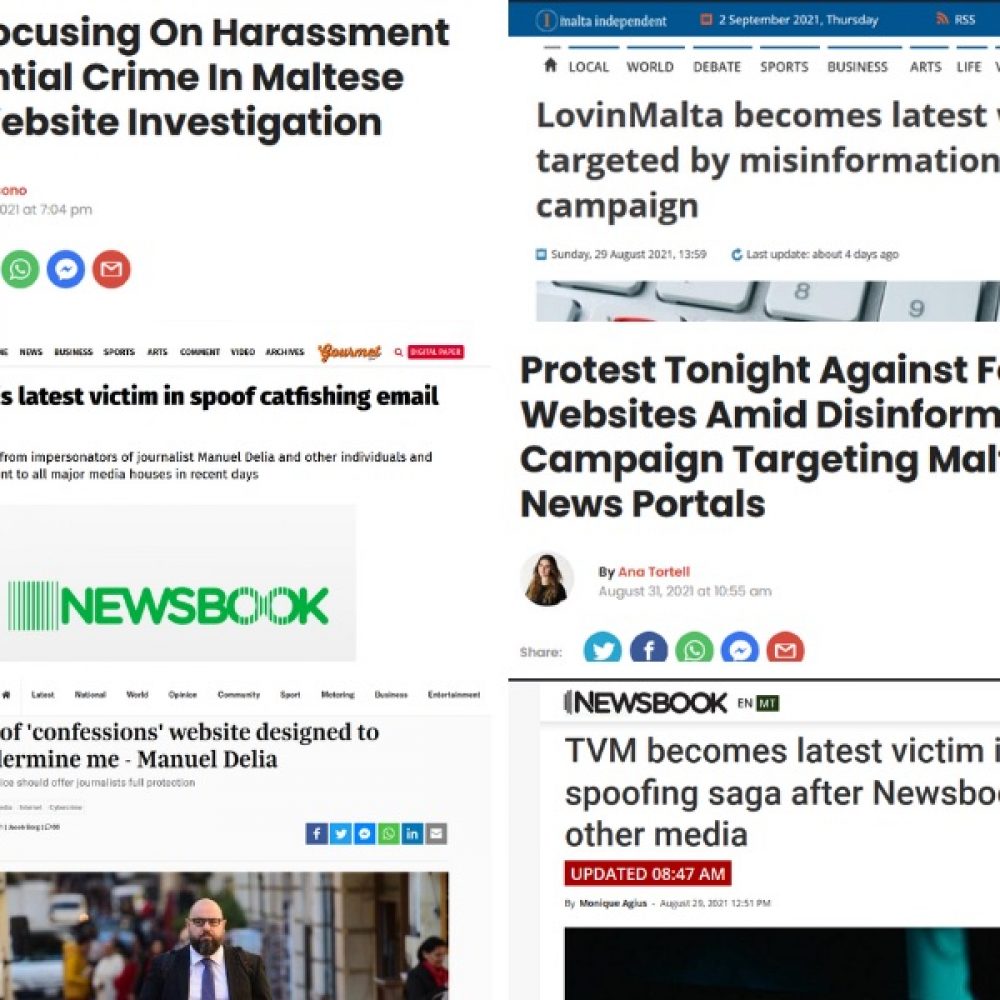Media outlets in Malta came under attack last week in a coordinated disinformation campaign aimed at discrediting independent news media, opposition MPs and activist groups critical of the Labour government in the lead up to an impending national election.
Several local news outlets had their websites cloned with poorly written fake articles aimed at discrediting prominent government critics. Fake email and message exchanges between anti-government activists and MPs were also forwarded to newsrooms under the guise of press releases.
The majority of the stories were aimed at undermining the legal case against Yorgen Fenech, currently on trial for the murder of investigative journalist Daphne Caruana Galizia.
The attacks have followed the same pattern the board of the public inquiry into Caruana Galizia’s assassination blamed for creating the atmosphere of impunity that led to her death.
In the case of the murdered journalist, the campaign was “orchestrated by people holding positions in State entities including the office of Prime Minister”, and aimed at discrediting Caruana Galizia’s investigations into high-level government corruption linked to major public projects.
The report found that “her isolation, taken with the reality of the impunity created by the deliberate inactivity of the institutions to perform their duties, translated into a climate of great risk. A climate in which those who wished, tried and succeeded in eliminating her found an opportunity and the opportune time to do so.”
This dangerous situation could have been addressed if Prime Minister Robert Abela had kickstarted the process to implement the public inquiry’s recommendations.
Instead, his failure to take action has meant that the culture of impunity which turned Malta into a den of corruption and money laundering and led to the murder of the journalist who exposed it, is still as strong as it was when Daphne Caruana Galizia was killed with a massive car bomb four years ago.
Last week’s spoofed websites are part of a long pattern of disinformation in a nation where political parties control large segments of the news media and the government dominates the public sphere.
In 2018, The Shift reported on a fake news portal aimed at attacking Socialist MEP Ana Gomez, a prominent critic of disgraced former prime minister Joseph Muscat. Stories from the fake portal were replicated by pro-government media and Labour MPs in Malta in an effort to discredit Gomez and her work.
The Shift also reported on a fictitious Facebook account aimed at spreading rumours about the government’s perceived enemies, including the family of Daphne Caruana Galizia, MEP David Casa, and businesses that were thought to support organisations calling for justice for the slain journalist.
In January 2020, The Shift wrote about how Dutch MP and Council of Europe Special Rapporteur Pieter Omtzigt, who was instrumental in forcing the Maltese government to hold the independent public inquiry into the journalist’s murder, had his Wikipedia page manipulated in order to discredit him. The change was made from an IP address of a Maltese government ministry.
In April that same year, The Shift reported a fake version of the news site Malta Today that attempted to distance money launderer and disgraced former chief of staff Keith Schembri from involvement in Caruana Galizia’s assassination. The domain for the fake site was purchased two days after State’s witness Melvin Theuma told a packed courtroom that Schembri “certainly” knew in 2018 of the involvement of Yorgen Fenech in the contract killing.
The main article on the false ‘Malta Today’ was titled, “How Keith Shembri [sic] Got Entangled In The Murder Of The Journalist Daphne Caruana Galizia Without Having A Hand In It”. That website, and a personal website showcasing Schembri’s rags to riches story and his love of the Labour Party, were swiftly taken down within hours of The Shift News report.
Daphne Caruana Galizia had also reported that a fake website masquerading as an official site for then Nationalist Party leader, Simon Busuttil, was set up in the midst of the heated 2017 electoral campaign when anti-corruption protests against Joseph Muscat were sweeping the country. The site was taken down following legal action.
The Shift has also been subjected to multiple cyber attacks since its founding, and its journalists have been the subject of online attacks. Reports to the underfunded and understaffed Malta police cybercrime unit have never led to concrete action, despite their best efforts.
Referring to this latest attack aimed at discrediting the case against Yorgen Fenech, Andrew Caruana Galizia, son of the slain journalist, said on Twitter, “The campaign is so clunky that everyone knows who’s behind it, which is why it has been successful in spreading fear”.
Prime Minister Abela’s failure to act on any of the recommendations of the public inquiry into Daphne Caruana Galizia’s assassination means that information will continue to be weaponised in Malta to discredit those fighting for justice for the slain journalist, and accountability for corrupt politicians.
Accused murderer Yorgen Fenech told his accomplice-turned-State’s-witness Melvin Theuma that they would be safe as long as Labour retained power.
The implications of having a large portion of Malta’s independent media so rapidly and easily compromised in the run-up to a general election is the most alarming aspect of this most recent attack.
The following project is weekly Maltese Roundups prepared by The Shift News (Malta) offering the latest news in Daphne Caruana Galizia case.

